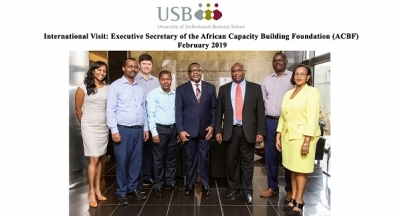
ACBF’s 28 years of experience as the continent’s premier capacity building organization, which in 2017 earned it the status of the African Union’s specialized agency for capacity building on the continent, can help South Africa devise innovative ways of tackling its education sector challenges, says Executive Secretary Prof. Emmanuel Nnadozie.
Speaking on 7 February at the University of Stellenbosch Business School, as the first Executive in Residence, Prof Nnadozie said education’s promise was not being fulfilled in Africa, including South Africa.
He identified some of the key issues in education in Africa as university proliferation, which, though paradoxically has led to an explosion in the number of universities, yet research remains stagnant.
In 1960, there were less than 200 universities continent-wide, but currently there are close to 2,000 universities. As a result, there has been an explosion of private universities, many of whom lack international recognition and while their existence has led to knowledge, there is little skill acquisition which runs side by side with too much schooling and yet too little learning.
According to Prof Nnadozie, the other key issues in education in Africa are lopsided enrolment in the arts, humanities and social sciences (accounting for 75% of enrolment), the provincialization of universities, the scarcity of funding, and the persistence of the “ivory tower” syndrome.
Speaking on the topic, “Education and Capacity Building for South Africa and the African Continent,” Prof Nnadozie said education was an important determinant of economic growth, employment and earnings, and therefore of economic development.
Turning to South Africa specifically, Prof Nnadozie said continued improvement and investment in education was critical to move forward. However, he warned that education, especially that provided by tertiary institutions, was “not the silver bullet to all of South Africa’s problems”.
According to South Africa’s National Development Plan, also called “Vision 2030”, the country expects to eliminate poverty from 39% to zero and reduce inequality from 0.7 to 0.6 Gini coefficient by the year 2030. The country also hopes to move towards becoming a socially and economically inclusive state in the next decade.
This is where ACBF’s 28 years of experience can help South Africa devise innovative ways of tackling the education sector challenges. As Prof Nnadozie put it: “Education-relevant lessons learned by ACBF across the continent shows that capacity development is a long-term process that requires continuous follow-through. Capacity has been built mostly in policy formulation and analysis but capacity for implementation remains a challenge even in the education sector.”
The lack of a systematic approach to using and retaining capacity built is another constraint. “Even when skills development initiatives are in place,” the ES said, “it is important to craft capacity retention and utilization policies.” He added that critical technical skills were essential capacities for Africa’s socio-economic transformation.“The stock of graduates is highly skewed towards the humanities and social sciences - accounting for more than 75% of students enrolled in universities”, and the ES wants this changed – and soon!
Concluding, Prof Nnadozie left his audience with some key messages and recommendations: “Education represents an important determinant of economic development and South Africa has done well to place education at the core of its Vision 2030.
“While some improvements are observed in the South African education system, challenges such as weak institutional capacity has resulted in little progress in implementing the Education Action Plan which expires in 2019 – especially in the provincial areas.
“Just like in most African countries, South Africa has a number of skills development initiatives in place but are often not adequately responding to the needs of the economy, hence creating unemployment.”
The ES therefore recommended that South Africa evaluate its ‘Action Plan to 2019: Towards the Realisation of Schooling 2030’ by using the emerging lessons to inform strategies on how to effectively tackle education challenges relating to poor learning outcomes, inadequate access to quality teaching and learning materials, and poor class management.
The country should also review the needs of the economy versus what the local universities are producing, by ensuring that there is a balance between critical technical and social science skills to support the country’s long-term vision of economic growth and inequality reduction.





